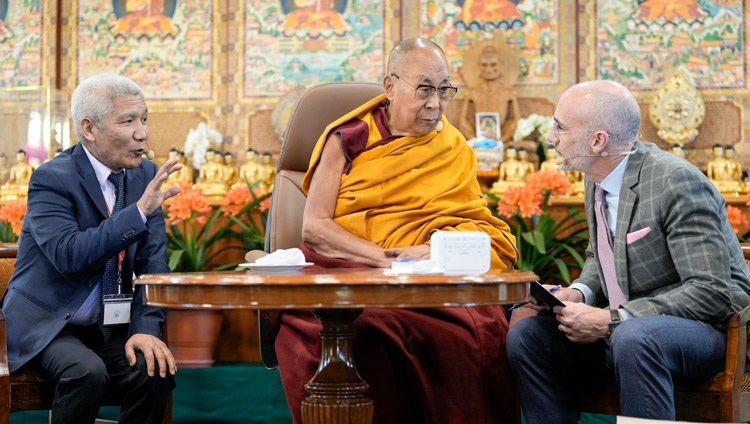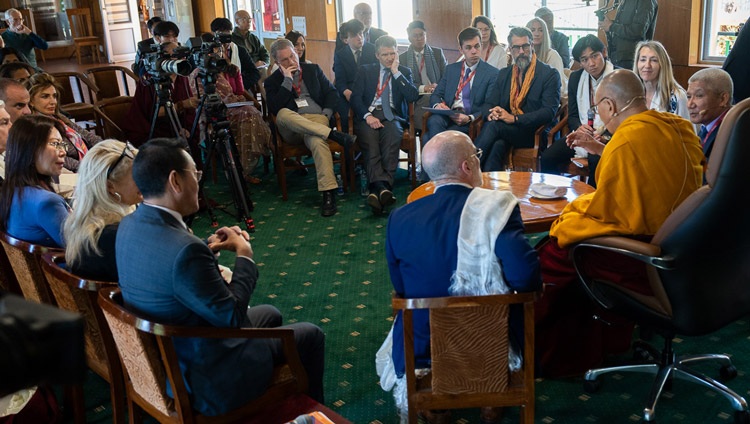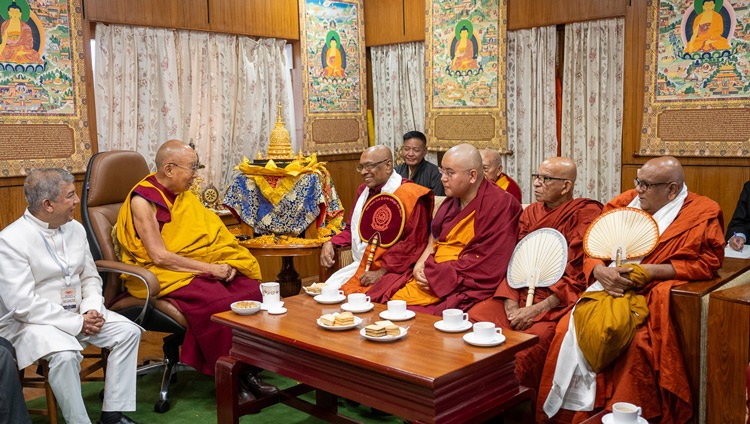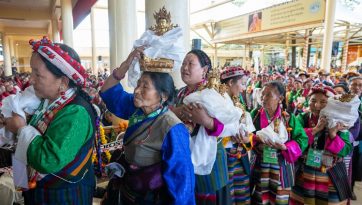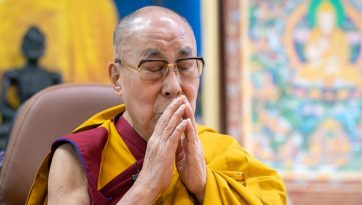Empathy and Compassion in Policing
February 17, 2021
Thekchen Chöling, Dharamsala, HP, India – At the start of this morning’s virtual conversation, His Holiness the Dalai Lama surveyed the faces on the screens in front of him, waved and greeted them saying, “Good morning and namaste”.
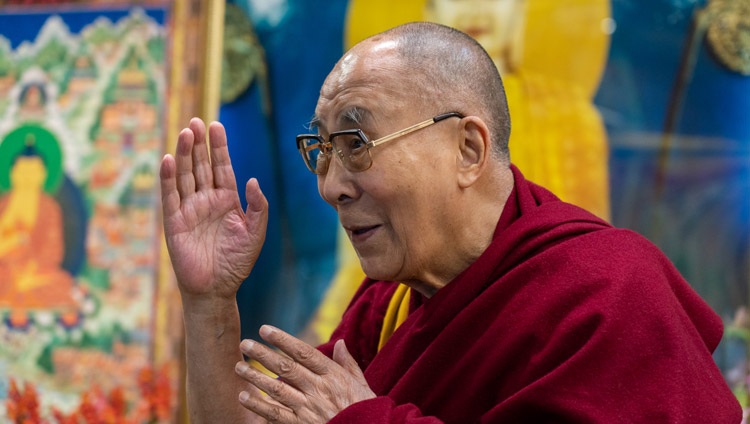
Prakash Singh, Chairman of the Indian Police Foundation (IPF) welcomed His Holiness on behalf of members of the IPF and the Indian Police Force in general. He explained that the Indian Police Force was originally set up by the British to support the imperial hold they had over the country. These days, he said, the police should reflect the democratic values of independent India in being humane, compassionate, fair and just. Singh declared that there is an interest in transforming the Indian police on these lines and quoted His Holiness’s advice that love and compassion are not luxuries; we need them to survive.
Having introduced His Holiness to the audience, he invited him to address them.
“Thank you,” His Holiness replied, “I feel very happy to be able to exchange views with members of the Indian Police Force today. I’ve lived almost my entire life in the presence of security personnel. For nine years in Tibet, they were Chinese police. Since 1959, they’ve been Indian police. Both worked to protect me, but the Chinese police had a second duty, which was to keep an eye on me.
“China is the most populous nation on Earth, it has an ancient culture and has traditionally been a Buddhist country, but there’s no freedom there. It’s a totalitarian regime. In India, on the other hand, there is genuine freedom and democracy. All the world’s major religions flourish here. When I meet Indian Muslims, I find there is no dispute between Shias and Sunnis. For thousands of years, Indians have observed ‘ahimsa’ and ‘karuna’ (non-violence and compassion). These are the principles the country follows and democracy accords with them.
“Religious traditions. local communities, different languages and modes of writing are all recognized and the people they belong to are happy to be part of India. This sets an example to the whole world. People with different languages and cultures can all live together and the Indian Police are protectors of the ‘ahimsa’ and ‘karuna’ that underlie this sense of belonging.
“I’m happy with the Indian Police. I’m not afraid of them. Every morning, when I step out of my house, I see police officers there who protect me day and night. I greet them and we often share a joke.
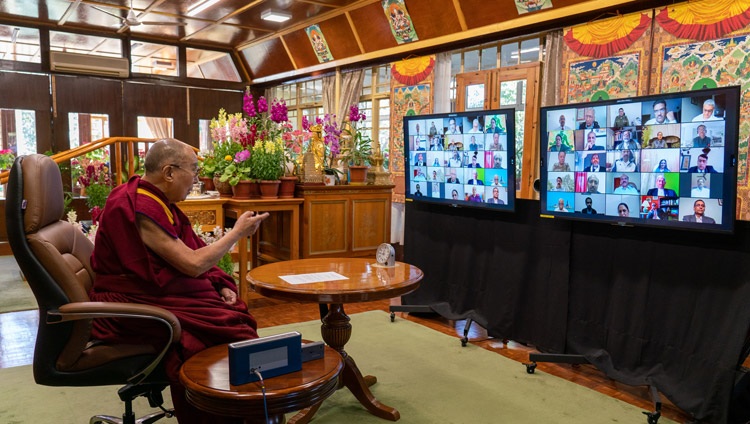
“So, what I want to tell you is that the present younger generations of Indians should pay more attention to ‘ahimsa’ and ‘karuna’, principles the whole world needs. This is what I want to tell you. The British introduced modern education and technological developments, which are useful. But you Indians should also preserve your own traditions that are thousands of years old.”
His Holiness noted that in the last century, the way Mahatma Gandhi practised non-violence during the Freedom Struggle greatly impressed others, from Nelson Mandela in South Africa to Martin Luther King in the USA. In this century too, India, where people with different languages, different faiths and so on live peacefully together, can set an example to the rest of the world. In a world where there is too much focus on differences of race, nationality and religion, India can promote harmony among people and nations.
“The seven billion people alive today,” he observed, “are all the same in being human. We all have to live together on this planet. We live in a global economy. We face problems like global warming that affect us all. The differences between us are secondary. What’s important is to recognise the oneness of humanity. It’s because I try to do this that I feel at home wherever I go.
“I really appreciate the Indian Police who protect not only the nation, but also these principles of non-violence, compassion and harmony that the world needs.”
In answering questions from the audience, police officers from across India, His Holiness emphasized that the quality of an action depends on the motivation behind it. Sometimes for good reasons, harsh measures may be required. Laughing, he pointed out that among the many deities depicted in Tibetan temples, some are fierce and wrathful. However, they are all expressions of compassion. In responding to particular situations, what’s important is to have a positive motivation and to view the goal from a broader perspective.
His Holiness mentioned that members of the police and army who guard the borders are protecting not only the land, but also the culture and values that have evolved here. They are making sacrifices in defence of principles. Therefore, they should be courageous and determined to carry on.
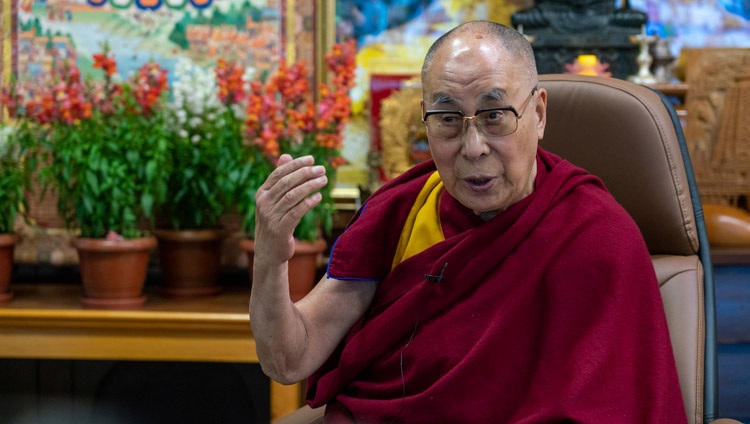
Since the Indian Police are defending freedom and democracy, there may be occasions when tough measures are required. He reiterated that the important thing is for them to examine their motivation and remind themselves of the principles on which they act.
His Holiness acknowledged that police work can be stressful and recommended seeing things from a wider perspective. Sometimes there’s a need to be strict. He cited an example from his childhood. One of his teachers, recognizing the young Dalai Lama’s intelligence, energy and tendency to be mischievous, advised another teacher to be strict and stern with him. The point was to benefit the young boy in the long run.
“When we look at things from a broader perspective,” His Holiness explained, “we may notice that human beings are social animals. Even as individuals we survive in dependence on the community in which we live. Therefore, showing compassion and concern for other members of our community is ultimately good for us too. If we’re selfish instead, we tend not to be happy.
“It’s basic human nature to be compassionate. The benefit that simple kindness brings the community is a matter of common sense. To strengthen these positive qualities, we need to combine the ancient Indian principles of ‘ahimsa’ and ‘karuna’ with modern education.
“Just as observing physical hygiene is necessary for bodily health, we need to implement emotional hygiene, learning to tackle our destructive emotions, if we are to achieve peace of mind. Since we all want to be happy, we all need to know how to cultivate inner peace, whether we follow a religious tradition or not. India’s secular tradition, showing respect for all religions is important, but religious practice is a personal matter, whereas cultivating compassion affects the whole community. What’s more, keeping up a compassionate motivation is part of Dharma practice. It’s the way to remain positive and optimistic.”
His Holiness suggested that to inspire public confidence, whatever they do, the police need to combine compassion with intelligence. And in a democracy the police need to be driven by democratic values, while at the same time maintaining a regard for ‘ahimsa’ and ‘karuna’. He added that it’s also important to be practical. Just because this is a free and democratic country doesn’t mean that everyone is motivated by moral principles. When some people are selfish and misbehave, strict measures may be necessary to protect the peace and harmony within society at large.
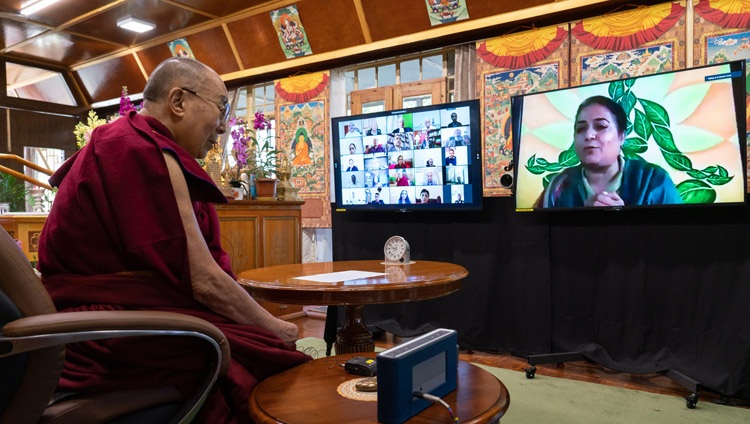
Finally, His Holiness was asked about the Buddhist system of justice. He replied that he didn’t know if there was one. Generally, Buddhist practice is a personal matter. If a monk breaks one of the main precepts, he may be expelled from the monastic community, but there are no other punishments. Other religious traditions may lay down rules of conduct and codes of behaviour, but Buddhism is primarily concerned with training the mind — with mental transformation — and the cultivation of inner values such as compassion and self-discipline. Students trained in such a system will naturally be more compassionate.
His Holiness stated clearly that he is opposed to the death penalty, arguing that even the worst wrongdoer can change if given the time and opportunity.
The moderator, N. Ramachandran, thanked His Holiness for his simple and appropriate advice on behalf of the Indian Police Foundation and the Indian police at large. He wished him good health and a long life.
“Thank you,” His Holiness replied. “I would also like to express my deep appreciation of the Indian police who protect me day and night. I have no fear. I trust them and respect them. Thank you.”

